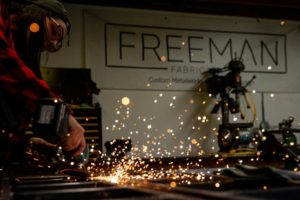When Camosun College Women in Trades alumnus Bronté Freeman—who took trades Foundations Level C in 2016 and Level B in 2017—was growing up, there was always tools and equipment around. Coming from a family of fix-it-yourself entrepreneurs, Freeman isn’t surprised she ended up where she did—as lead fabricator and business owner of local welding company Freeman Fabrication—but at first she started down a completely different path.
“Right out of high school, I went to university and I took a Sports Medicine degree, because I was big into sports,” she says, “and I didn’t actually fully commit or even think about the trades until I finished my degree.”

But her upbringing came calling one day when she was helping her uncle out in his shop around Christmas.
“He asked if I wanted to try welding,” she says. “I was instantly mesmerized and drawn to the trade, and started doing more research about it.”
Now, five years later, Freeman sees her profession everywhere she goes. It’s hard to go into a home or office building without being drawn to something; she’s always looking under tables and desks to check out the weld.
“I realized how versatile it was,” she says. “I originally thought, ‘I don’t want to be in the oil rigs; I don’t want to be doing that type of work.’”
Welding wasn’t something Freeman was exposed to a lot as a child, but as she got more and more into it, the creativity began to draw her even further in.
“That’s why the business started out as a furniture company, but we’ve gradually transitioned into more custom metal work—gates, railings, stringers; all that good stuff,” she says.
Freeman pays particular attention to a product’s finish and the details of the look and feel of it.
“We spend more time on the grinding, or the polishing,” she says. “There’s a lot of attention to detail. I’ve always wanted to offer that.”
For Freeman, being part of an industry that is still largely male-dominated means boundaries are of the utmost importance, but roadblocks and inequalities are present in all industries, she says.
“It’s something that we do encounter as women in the trades, because we are still a minority on worksites, and still a minority, especially, as business owners,” she says. “Personally, I just like to focus on being myself. I like to let my work speak for itself.”
Freeman says that Camosun played a big role in the connections she made, not just in terms of gender equality in her program, but also because the instructors worked really hard to make sure that students made industry connections so they could get a job once they graduated.
“[Women In Trades Training] were huge in making connections and opening doors for you outside of school,” she says. “I think that’s huge for women to utilize that program.”
Freeman says she now sees how heavily integrated steel work and welding is in society. She also says that, like anything, becoming a good welder takes a lot of work.
“You’re not just a good welder all of a sudden. You have to work on your skills,” she says. “Fabrication is a totally different element to welding; learning how to build things, and learning the proper steps you need to take to build a box. You think that building a box is easy; it’s not… As soon as I became familiar with welding, it’s everywhere… you can’t really build a structure without it.”
